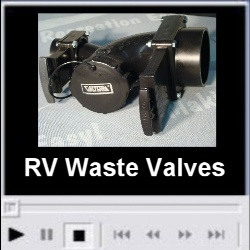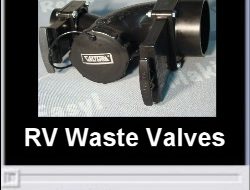One topic about our RV seldom discussed in-depth is the RV waste valves. You know what I mean, the valves you open when it’s time to empty the RV holding tanks. We don’t really think about them much, you just hope they work okay when it’s time to use them.
But what happens when one of the waste valves breaks or starts to leak? What do you do now? If it’s a serious problem, like a blown out tire damaging the entire holding tank plumbing system, it’s probably best left to an RV repair shop. But, there are some simple things the RV owner can do to maintain or repair the RV waste valves too.
That’s what I want to demonstrate today. Some things you can do maintain the RV waste valves, and help prevent other problems from occurring. For the ‘Do it Yourselfers’ out there it’s not that difficult to repair or even replace a damaged or leaking RV waste valve.
Sit back, relax and learn everything you need to know about your RV waste valves.
Click on the video player to watch the RV Waste Vavle video
Happy Camping,
Mark Polk



ri industries
The plumbing system of my septic tank had a problem, so I tried fixing it, thinking that I can do it and it will be costly if I hire someone. What happened was the whole plumbing system was affected and damaged. Lesson learned, hire the expert.
Pingback: my homepage
Rob Hughes
One thing the video did not address is lack of “slop” (loose tolerances) of piping on either side of a valve. I had a gray tank leak last year. The fit was so tight that the seals would roll out everytime I tried to put the valve back in between the flanges. I tried prying, etc. The only thing I could do was cut about 3/4″ of piping out, remove the valve assembly, slide a 1 and 1/2″ rubber sleeve up the pipe (lubed with some silicon grease), reinstall the rebuilt valve, then slide the sleeve down over the gap and tighten the clamps. No worrys so far.
One last thing. Most campgrounds won’t, for good reason, let you tackle a repair like that. While you have a sewer connection, use a clear plastic elbow and some colored tank deodorizer to determine which tank/valve needs to be repaired.
River
Constance, yours is the voice of experience that was needed in this thread! Thanks for your wisdom. You’ve touched on the tip of the iceberg of reasons why composters aren’t in RVs. Ken L had not presented his idea with an eye for practicality as you have.
Other major concerns for not using composting toilets in RVs would be the weight and bulk of the composting reactor, a means of collecting/draining/managing excess lechate, finding a community of licensed seepage haulers to evacuate the matter, not to mention sanitary, convenient and odorless ways to manage process controls such as mixers, oxygenation and aerobic organisms in the active and curing zones of the composter bed.
Meanwhile, we should take advantage of black tank/grey tank management experiences of folks like Mark Polk, and stay away from composting in RVs.
Thanks Mark for an interesting and informative article on the tank valves!
Constance
I had a composting toilet near my cabin. They require heat and they smell (why not in the cabin!). I just don’t think they would work unless we went to some type of electrical zapping, which would use a lot of power.
Rick Ellerbeck
A very informative article. There is a wealth of information here, some very important such as lubrication and sanitation. As the manufacturer of the Twis-Loc termination valve, in production for over 40 years and installed on hundreds of thousands of RVs, in both manual and air powered versions, up to and including the 2010 model year, there are some omissions in your article. After viewing your video, an unsuspecting consumer would be left to believe that a leak or broken handle could simply be fixed with the demonstrated parts. An RV equipped with the Twis-Loc termination valve will not accept any of the parts demonstrated in the video. The Twis-Loc valve is a gate type valve with a wedge shaped gate with and integral seal. Of course, it requires a proprietary type seal, nothing like the Valterra/Bladex type seal. The handle is designed to lock the valve from accidental opening and ensure a complete seal, all with a simple twist of the handle. Again, this requires a proprietary Twis-Loc handle. I would like to compliment you on your expose on termination valves and the important service and safety precautions involved.
George
I was expecting some mention of only using RV toilet paper. I’ve been rv-ing since 1986 and always use two ply household type TP and have never had a problem…until this year. I had a seeping black water valve and since it’s buried in the heated basement of my 5th wheel I let the rv shop do a replacement. I don’t know if it was the TP that caused the problem but if it was it would be a first for me. No doubt what I saved over the years more than paid for a new valve which I may have needed anyway and with the thin rv TP you generally need to fold it……….well, let’s not go there.
River
Hey Ken Locarnini. Sounds like an intriguing idea, but I’m pretty sure many of us haven’t much information on what a composting toilet is, how it works, how it would fit into the RV life, what kind of maintenance it needs, what it costs and so forth. Would you please expand on your thoughts for us who just keep thinking black tank/grey tank? I’d really like to understand the benefits and drawbacks. Have you installed one? Can I do the same? Thanks.
Ken Locarnini
Thanks for the info.
It would be nice if we could move towards composting toilets as an alternative to the whole black tank messy scenario, with the added benefit that we could enrich the soil, wherever we travel!
Janice
I had a leaking black tank valve and it took me a while to figure out it was happening. In the meantime, the liquids had leached out leaving, uh, the remainder in the tank. For a time I used a Flush King elbow with its valve as quick fix. But getting TO the valve to replace it was a much more expensive proposition.